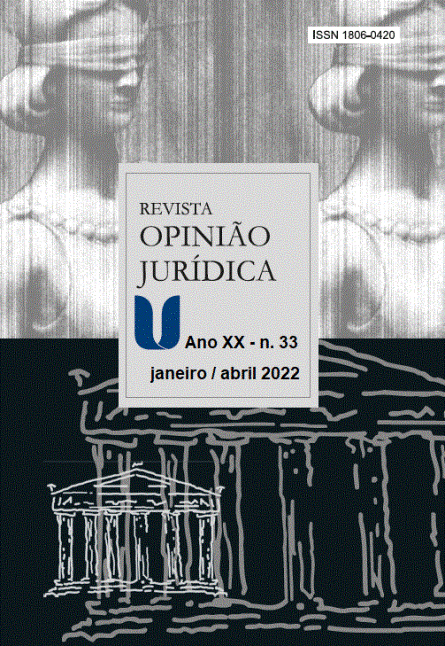THE RIGHT TO A BALANCED AND HEALTHFUL ECOLOGY IN THE LEGAL FRAMEWORK OF THE EUROPEAN CONVENTION OF HUMAN RIGHTS AND CASE LAW OF THE ECtHR
DOI:
https://doi.org/10.12662/2447-6641oj.v20i33.p103-134.2022Palavras-chave:
right to healthy and favorable environment, Convention for the Protection of Human Rights and Fundamental Freedoms of 1950 (further - Convention), European Court of Human Rights (further - ECHR, Court), environmental cases, ecological cases, eco-cases, huResumo
Objective:The author seeks to understand the content and legal guarantees of the right to sustainable, healthy and favorable environment in the jurisprudence of the European Court of Human Rights. The researcher seeks to list the case law of the ECtHR corresponding to environmental issues in order to define concrete aspects related to responsibility of the States for the climate change and global warming. The author analyzes new legal trends on the protection of the rights of individuals and groups to complain for violations of their rights to a healthy and favorable environment in the light of the European Convention on Human Rights. The article is focused on positive state obligations on a healthy and sustainable environment under the Convention provisions, Russian experience in eco-cases, admissibility criteria for complaints to the European Court of Human Rights in “environmental cases”. The writer gives an overview of the ECtHR’s legal positions on the right to a healthy and favorable (i.e. prosperous, clean, safe, quiet, calm, quality) environment by type of its pollution. The author considers the importance of facilitating the right to healthy environment according to the UN Sustainable Development Goals.Methodology: The research uses general scientific and special cognitive techniques wherein legal analysis and synthesis, systemic, formal-legal, comparative-legal, historical-legal and dialectical methods are applied. The author applied a case study method to select the most recent and pilot cases of the ECtHR practice.
Results: The author founds out that despite the fact of a non-exhaustive list of the legal positions of the ECtHR concerning the environment effect on human life and health, there is a certain trend in Council of Europe towards an extended interpretation of the human right to healthy ecological situation responding to new challenges to the realization that right, such as, the decarbonization of industrial processes, right to light, right to fresh air, clean water and clean atmosphere, etc. The study concludes with an idea that right to sustainable, healthy and favorable right is a collective right. From the practical perspective, potentially group of individuals should complain to the international judicial institutions to the violation of this right. The importance of the protection of that right is increasing within the technological progress. The right to healthy environment imposes to the European States a legal obligation to ensure right to life, prohibition of torture, right to privacy, right to a fair trial, right to an effective remedy and prohibition of discrimination. The researcher also point out that cases of environmental rights violations are complicated in terms of preparing a complaint and processing by the ECtHR. Due to this fact, it is hard to do so with regard to the causal link between the acts (omission) of state agencies, the violation of environmental rights and the consequences that occurred. It is not clear from the text of the Convention which article directly should be applied.
Contributions: Following a review of the content, the author raised possible problems, strategies, suggestions and guidelines for the protection of the right to sustainable and healthy environment. The author concluded that near future new categories of legal cases related to the state responsibility for global warming and climate change will appear in international and national judicial system. The author encourages the complement to the international legal regulation of the protection of the right to healthy, sustainable and favorable ecology on universal and regional level.
Downloads
Publicado
Como Citar
Edição
Seção
Licença
TRANSFERÊNCIA DE DIREITOS AUTORAIS
A submissão de artigo à apreciação da Equipe Editorial da Revista Opinião Jurídica implica, por este mesmo ato, a cessão, por parte do(s) autor(ES), para o Centro Universitário Christus – UNICHRISTUS, da referida OBRA para fins de reprodução, divulgação, distribuição, impressão, publicação e disponibilização, em qualquer forma ou meio que exista ou venha a existir, nos termos do art. 49 e os seguintes da Lei 9.610/98.
Parágrafo Primeiro. A cessão, objeto deste Termo, é feita a título não exclusivo e gratuito, abrangendo a totalidade da OBRA.
Parágrafo Segundo. A UNICHRISTUS poderá disponibilizar, para fins didáticos, a OBRA no todo ou em partes, vedada a alteração de seu conteúdo textual, ressalvadas correções e formatações que se fizerem necessárias.
Parágrafo Terceiro. A cessão é válida em quaisquer países, em língua portuguesa ou tradução, a critério da UNICHRISTUS.
DAS RESPONSABILIDADES
Ao submeter(em) artigo de sua lavra, o autor (e co-autores, se houver) assume(m), por este ato, a responsabilidade exclusiva pela integralidade do conteúdo da obra de sua autoria. Dessa forma, quaisquer medidas judiciais ou extrajudiciais concernentes ao seu conteúdo serão de sua inteira responsabilidade.
Parágrafo único. Em caso de pluralidade de autores, considera-se solidária a responsabilidade, ressalvadas as provas em contrário.






























